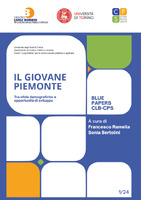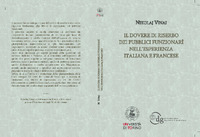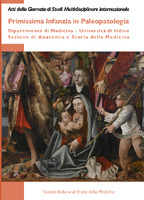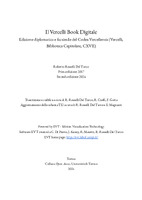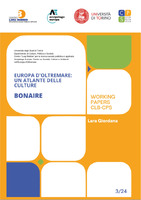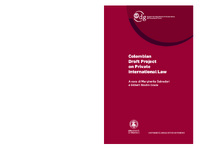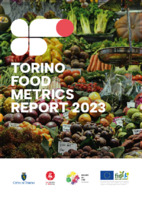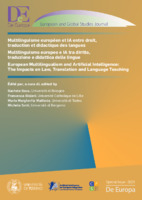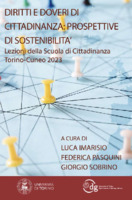Sfoglia documenti (217 in totale)
Sort by:
IV Rapporto dell'Atlante del Cibo di Torino Metropolitana
Il quarto Rapporto dell’Atlante del Cibo di Torino Metropolitana segue una struttura tematica frutto della sistematizzazione dei contributi pervenuti attraverso la call for paper, pensata per far emergere e condividere la conoscenza prodotta sul sistema del cibo che nutre Torino nelle sue molteplici dimensioni. Attraverso la call, lanciata nel 2021 e rivolta agli atenei, ai centri di ricerca pubblici e privati, agli enti pubblici, alle organizzazioni/associazioni del terzo settore e alle associazioni di categoria, sono stati raccolti 40 contributi, che confluiscono in sette sezioni tematiche, seguendo idealmente le fasi del sistema alimentare – incrociate con varie dimensioni e spazi del cibo - dalla produzione allo scarto, passando per le questioni legate alla salute e alle disuguaglianze.
Il giovane Piemonte Tra sfide demografiche e opportunità di sviluppo
Il Piemonte sta vivendo una significativa crisi demografica, con una continua diminuzione della popolazione giovanile, fenomeno che si inserisce in un più ampio processo di invecchiamento demografico che interessa l’Italia e l’Europa. La regione, pur mantenendo un tasso di occupazione giovanile superiore alla media nazionale, si trova di fronte a sfide importanti legate alla precarietà del lavoro, al ritardo nel raggiungimento dell’autonomia e alla difficoltà di accesso a un adeguato livello di benessere. Negli ultimi decenni, la popolazione giovanile piemontese è diminuita di quasi un terzo, e l'indice di vecchiaia ha posto il Piemonte tra le regioni italiane con il maggiore invecchiamento. Questo scenario genera un circolo vizioso tra fragilità demografica ed economica, in cui la diminuzione della popolazione giovanile porta a una contrazione della forza lavoro, influendo negativamente sullo sviluppo e sulle opportunità economiche. Esiste, quindi, una questione giovanile in Piemonte, che rappresenta una cartina di tornasole dello stato di salute del suo modello di sviluppo. Infatti, alla regione-giovane dell'epoca dello sviluppo, si contrappone oggi la regione-vecchia dell'epoca del regresso. Tuttavia, a fronte di questo declino, sta emergendo una nuova generazione di giovani che si distingue per il proprio impegno sociale, una maggiore mobilitazione politica e una rinnovata partecipazione nella sfera pubblica.
Il “Centro «Luigi Bobbio» per la ricerca sociale pubblica e applicata” dell’Università di Torino ha condotto una ricerca empirica tra i giovani piemontesi, analizzando temi cruciali come il lavoro, le tecnologie, la percezione del futuro, i valori e la partecipazione politica. I risultati evidenziano uno “sguardo preoccupato” verso il futuro, con particolare attenzione alle condizioni materiali di vita, ma anche un diffuso ottimismo tecnologico, accompagnato da una crescente sensibilità verso la sostenibilità ambientale e la giustizia sociale. La ricerca mostra inoltre una forte mobilitazione su temi come il cambiamento climatico, i diritti civili e l’antifascismo, sebbene la fiducia nelle istituzioni tradizionali sia piuttosto bassa.
Ciò che emerge da questo studio è la nascita di una nuova generazione, quella della policrisi, caratterizzata da atteggiamenti e comportamenti distintivi, che sta cercando di delineare un futuro alternativo, meno legato ai modelli di sviluppo tradizionali e più orientato verso la sostenibilità e l'inclusione sociale. Questa generazione, tuttavia, rimane in gran parte invisibile alla politica, che spesso non riesce a rispondere adeguatamente alle loro aspettative e bisogni. Il rapporto sottolinea l'urgenza di sviluppare politiche giovanili integrate, che favoriscano l'autonomia, la partecipazione attiva e l'inclusione dei giovani nel processo di trasformazione della regione, in modo da sostenere un rilancio economico e sociale basato su innovazione tecnologica e sostenibilità.
Piedmont is experiencing a significant demographic crisis, with a continuous decline in the youth population, a phenomenon that fits into a broader demographic aging process affecting Italy and Europe. The region, while maintaining a youth employment rate higher than the national average, faces major challenges related to job insecurity, delays in achieving independence, and difficulty accessing an adequate standard of living. In recent decades, the youth population in Piedmont has decreased by almost a third, and the aging index has placed the region among the Italian regions with the highest rate of aging. This scenario creates a vicious circle between demographic and economic fragility, in which the decrease in the youth population leads to a contraction in the workforce, negatively impacting development and economic opportunities. Therefore, there is a youth issue in Piedmont, which acts as a litmus test for the health of its development model. The region once vibrant with a youthful population in the era of development now stands as a region dominated by the elderly in this era of decline. However, in the face of this decline, a new generation of young people is emerging, distinguished by its social commitment, greater political mobilization, and renewed participation in the public sphere.
The “Centro «Luigi Bobbio» for Public and Applied Social Research” at the University of Turin conducted an empirical study among young people in Piedmont, analyzing key themes such as work, technology, perceptions of the future, values, and political participation. The results highlight a "worried outlook" towards the future, particularly regarding the material conditions of life, but also a widespread technological optimism, accompanied by an increasing sensitivity towards environmental sustainability and social justice. The research also reveals strong mobilization on issues such as climate change, civil rights, and antifascism, although trust in traditional institutions is relatively low.
What emerges from this study is the birth of a new generation, that of the polycrisis, characterized by distinctive attitudes and behaviors, seeking to outline an alternative future, less tied to traditional development models and more focused on sustainability and social inclusion. This generation, however, remains largely invisible to politics, which often fails to respond adequately to their expectations and needs. The report emphasizes the urgent need to develop integrated youth policies that promote autonomy, active participation, and the inclusion of young people in the region's transformation process, in order to support an economic and social revival based on technological innovation and sustainability.
Il dovere di riserbo dei pubblici funzionarî nell’esperienza italiana e francese
Il presente lavoro indaga il tema del dovere di riserbo inteso come legittima limitazione alla libertà di espressione dei pubblici funzionarî.
Il percorso seguito si snoda attraverso un confronto tra l’esperienza italiana (caratterizzata da un tasso più lieve di formalizzazione) e quella francese dell’obligation de réserve (connotata, invece, da un approfondimento ben più risalente della giurisprudenza amministrativa e, più limitatamente, del Legislatore), corredato da alcuni ulteriori cenni comparatistici inerenti le principali esperienze europee e nordamericane.
Dopo aver analizzato gli aspetti generali della questione nel contesto italiano e francese, ci si concentra sull’approccio di questi due paesi rispetto a categorie particolari di funzionarî pubblici, ossia il personale militare, quello di pubblica sicurezza, quello diplomatico e quello appartenente alla Magistratura, avendo anche attenzione a specifici casi recentemente occorsi, ponendo in risalto le relative differenze e similitudini.
Infine, ci si sofferma sull’evoluzione della giurisprudenza della Corte europea dei diritti dell’uomo di Strasburgo in materia di limitazioni alla libertà di espressione ex art. 10 CEDU relativamente ai pubblici funzionarî, con particolare attenzione al delicato tema del riserbo degli esponenti dell’ordine giudiziario.
Primissima Infanzia in Paleopatologia. Atti della Giornata di Studi Multidisciplinare Internazionale
Il volume degli atti della "Giornata di Studi multidisciplinare Internazionale sulla Primissima infanzia in paleopatologia", raccoglie le relazioni esclusivamente di argomento paleopatologico, presentate nel corso dei lavori congressuali, tenuti a Udine il 2 dicembre 2023. Il Convegno è stato promosso e organizzato dalla Sezione di anatomia e storia della medicina del Dipartimento di Area medica (DAME) dell'Università di Udine cui ha fornito il suo sostegno la Sezione di paleopatologia, paleoradiologia e studi fisici della Società italiana di storia della medicina, nella convinzione dell'utilità di raccogliere in una composita visione storico-medica l'apporto di studi multidisciplinari su di argomenti di grande complessità e attualità. Il Convegno è anche stato sostenuto dal Museo archeologico nazionale di Cividale. Il volume degli atti è preceduto dalla presentazione accurata e stimolante di Paola Cosmacini che introduce le sette ampie relazioni che hanno impreziosito il Convegno sulla paleopatologia della primissima infanzia.
Il Vercelli Book Digitale / The Digital Vercelli BookEdizione diplomatica e facsimile del Codex Vercellensis (Vercelli, Biblioteca Capitolare, CXVII) / A diplomatic edition with facsimile of the Codex Vercellensis (Vercelli, Biblioteca Capitolare, CXVII)
Il Vercelli Book è un manoscritto redatto verso la fine del X secolo contenente una miscellanea di opere a carattere religioso, in versi e in prosa. Si tratta di un codice di grande importanza per gli studi sulla lingua e letteratura anglosassone perché è uno dei quattro manoscritti (gli altri sono l'Exeter Book, il Cotton Vitellius A XV e il ms Junius) che conservano il 90% circa di tutta la produzione poetica in inglese antico, ed è l’unico a non essere custodito in Inghilterra. In questa seconda edizione viene pubblicato un facsimile digitale completo, con immagini in alta risoluzione (singole e a doppia facciata), e con tutti i testi in poesia (Andreas, I fati degli Apostoli, Anima e corpo, Frammento omiletico I, Il sogno della Croce, Elena) e in prosa (le 23 Omelie) presentati su due livelli di edizione (diplomatica e interpretativa). Questa edizione digitale offre strumenti per la navigazione e lo studio di immagini (zoom, hotspot) e testi (collegamento testo-immagine, motore di ricerca, supporto per le named entities). Tutti i testi sono stati annotati utilizzando gli schemi di codifica XML/TEI (https://tei-c.org/). Per altre informazioni sulla storia del progetto e sulle caratteristiche dell’edizione digitale si rimanda all’Introduzione in formato PDF (in italiano) e alle Informazioni sul progetto/Information about the project disponibili all’interno dell’edizione stessa (in inglese).
The Digital Vercelli Book, a cura di R. Rosselli Del Turco; trascrizione e codifica a cura di R. Rosselli Del Turco, R. Cioffi, F. Goria; aggiornamento dei documenti TEI a cura di R. Rosselli Del Turco e E. Magnanti; software EVT creato da C. Di Pietro, J. Kenny, R. Masotti, R. Rosselli Del Turco. 2024. ISBN 9788875903237.
Sfoglia l'edizione digitale
The Digital Vercelli Book, a cura di R. Rosselli Del Turco; trascrizione e codifica a cura di R. Rosselli Del Turco, R. Cioffi, F. Goria; aggiornamento dei documenti TEI a cura di R. Rosselli Del Turco e E. Magnanti; software EVT creato da C. Di Pietro, J. Kenny, R. Masotti, R. Rosselli Del Turco. 2024. ISBN 9788875903237.
Sfoglia l'edizione digitale
Bonaire
Questa scheda analizza il territorio di Bonaire ed è parte di Europa d’Oltremare: un Atlante delle culture, realizzato da Arcipelago Europa – Centro di ricerca su Culture, Società e Ambienti nell'Europa d’Oltremare.
Europa d’Oltremare: un Atlante delle culture è un progetto di pubblicazione che mira a diffondere la conoscenza degli Oltremare europei ponendo attenzione alle relazioni sociali e agli ambienti, alle peculiarità linguistiche, culturali e istituzionali, alle relazioni interetniche e alle diseguaglianze socioeconomiche, alle forme di autonomia e alle rivendicazioni di sovranità. Si tratta di un atlante socioculturale composto di schede dedicate ai singoli Paesi e Territori d’Oltremare (PTOM) e Regioni Ultraperiferiche (RUP) dell’Unione europea. Le schede sono curate da Arcipelago Europa in collaborazione con docenti, ricercatori, ricercatrici, specialisti e specialiste degli e dagli Oltremare.
Nell'ordinamento dell’Unione europea i Paesi e Territori d’Oltremare (PTOM) sono isole associate all'UE in virtù della relazione speciale che intrattengono con uno degli Stati membri (Francia,Danimarca, Regno dei Paesi Bassi). Seppur non indipendenti, i PTOM sono dotati di peculiari forme di autonomia nei confronti degli Stati a cui sono legati. Essi non fanno parte del territorio dell’UE, ma i loro abitanti sono cittadini europei e partecipano alle elezioni europee.
Le Regioni Ultraperiferiche (RUP), invece, fanno parte dell’UE, in quanto parte integrante del territorio di uno degli Stati membri (Spagna, Portogallo, Francia). Vi si applicano pienamente il diritto nazionale e quello comunitario.
Colombian Draft Project on Private International Law
The Project on Private International Law for Colombia, elaborated by the Istituto Antioqueño de Derecio Internacional Privado (IADIP Draft Law – PGLPIL), presents an opportunity for everyone interested in Private International Law to have a holistic view into the subject. The book brings together a team of international experts in the area covering different perspectives. It presents an excellent mapping of how Colombia can build a strong synergy with the comity of nations in its international affairs and to better ‘communicate’ with other national legal systems.
Multilinguisme européen et IA entre droit, traduction et didactique des langues
Multilinguismo europeo e IA tra diritto, traduzione e didattica delle lingue
European Multilingualism and Artificial Intelligence: The Impacts on Law, Translation and Language Teaching
Ce numéro spécial de la revue De Europa recueille les contributions interdisciplinaires et multilingues issues des travaux du groupe de recherche sur les droits et les variations linguistiques en Europe qui ont été entamées depuis 2020 pour le projet Artificial Intelligence for European Integration — AI4EI.
La première partie du livre a permis d’entamer des réflexions sur l’IA et le multilinguisme européen par rapport au droit, par exemple en abordant la question de la traduction juridique automatique ou de la terminologie juridique en relation à l’utilisation de l’IA.
La deuxième partie du livre rassemble des études concernant les expérimentations pédagogiques menées par les universités qui ont participé au projet. À ce sujet, la nécessité de stimuler une posture critique vis-à-vis des nouvelles technologies se révèle fondamentale pour une intégration réussie des dispositifs basés sur l’intelligence artificielle dans la pédagogie universitaire.
Il volume fa parte del progetto AI4EI (https://www.jmcoe.unito.it/)
La première partie du livre a permis d’entamer des réflexions sur l’IA et le multilinguisme européen par rapport au droit, par exemple en abordant la question de la traduction juridique automatique ou de la terminologie juridique en relation à l’utilisation de l’IA.
La deuxième partie du livre rassemble des études concernant les expérimentations pédagogiques menées par les universités qui ont participé au projet. À ce sujet, la nécessité de stimuler une posture critique vis-à-vis des nouvelles technologies se révèle fondamentale pour une intégration réussie des dispositifs basés sur l’intelligence artificielle dans la pédagogie universitaire.
Il volume fa parte del progetto AI4EI (https://www.jmcoe.unito.it/)
Diritti e doveri di cittadinanza: prospettive di sostenibilità
Questa pubblicazione rappresenta ormai la quarta tappa di un percorso di riflessione sui diritti e i doveri di cittadinanza, elaborato a partire dalle lezioni della Scuola di Cittadinanza, iniziativa di terza missione organizzata dal Dipartimento di Giurisprudenza dell’Università degli Studi di Torino, nelle sedi di Torino e di Cuneo, a partire dal 2018.
Nell’edizione 2023 della Scuola si è proposto un itinerario di riflessione che, a partire da un inquadramento “di contesto” – il mondo globalizzato e la sua crisi, la complessità dei processi decisionali tra Italia e Unione Europea –, ha esplorato, da prospettive differenti, le implicazioni del principio di “sostenibilità” sui diritti e doveri fondamentali. Ci si è così confrontati coi temi della tenuta dei diritti fondamentali di fronte al dramma della guerra, delle potenzialità e dei limiti dell’impiego degli strumenti del diritto penale in relazione alla sostenibilità ambientale, della sostenibilità delle politiche di contrasto alla fragilità (che chiamano fortemente in causa i rapporti intergenerazionali), della gestione sostenibile delle diversità legate ai convincimenti etico-religiosi.
Con riguardo alla dimensione economica del principio di sostenibilità, si sono poi proposte riflessioni sul principio di sostenibilità intergenerazionale in relazione alle politiche tributarie e di bilancio, così come sulle implicazioni dei principi di sostenibilità e responsabilità nell’impresa e nel contesto lavorativo. Ci si è infine soffermati sul problema della sostenibilità del nostro stesso “modello” di democrazia (anche in relazione ai delicati rapporti tra decisione politica e controllo giurisdizionale), confrontandoci anche con le suggestioni e gli stimoli di “modelli” alternativi, ma animati a loro volta da obiettivi di solidarietà e responsabilità intergenerazionale, come quello legato alla proposta di una “Costituzione per la Terra” di Luigi Ferrajoli.
L’intento complessivo del Volume – pur nell'oggettiva impossibilità di esaurire un tema così controverso ed intricato quale quello delle diverse declinazioni del paradigma della sostenibilità, con riguardo ai diritti e doveri fondamentali – è far emergere, al di là dell’uso divenuto ormai tanto pervasivo quanto sfuggente ed ambiguo dei richiami a tale principio, una rete di implicazioni che, su diversi piani e a partire da diverse prospettive, incidono in misura determinante sul riconoscimento e sulla tutela delle libertà e dei diritti individuali, e rimodulano i correlativi doveri. Con l’ambizione (che anima la Scuola fin dal suo avvio) di proporre riflessioni che, partendo da elementi emergenti nell’attualità del confronto pubblico a livello nazionale e sovranazionale, consentano di fornire stimoli e di contribuire ad arricchire gli strumenti con cui maturare un giudizio più articolato e consapevole in ordine alle principali “questioni” connesse ai diritti e doveri di cittadinanza.


